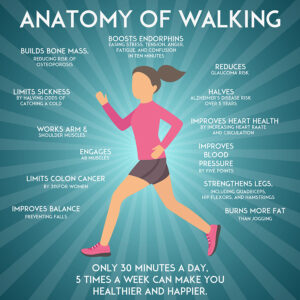This article is about the finding of a study that physical exercise reduces cancer risk significantly. The study was published on July 27, 2023 in JAMA Oncology. The international team of researchers were from Spain, Australia, Calgary (Canada) and Denmark. The data stemmed from the US National Health Interview Survey. It consisted of 500,705 eligible US adults who were included in the study and followed up during a median of 10.0 years. The study ran from 1997 to 2018. The physical activity was measured as moderate aerobic physical activity (MPA), vigorous aerobic physical activity (VPA) or muscle-strengthening activity (MSA).
The participants were linked to the National Health Index with respect to cardiovascular and cancer death rates. The average age of the 500,705 participants was 46.4 years. 58% were female and 77% were White.
Study findings about cancer and cardiovascular risk reduction with exercise
The highest exercise group was a combo of MPA, VPA and more than 2 or more MSA sessions per week. After 10 years this group achieved a 50% reduction of the overall mortality. Optimal CVD and cancer mortality risk reduction was achievable in the following way. The researchers found that for a 70% CVD or cancer mortality reduction the following exercise requirements were necessary. 150 to 225 minutes of MPA, more than 0 to 75 minutes of VPA, and 2 or more MSA sessions per week. All in all, the study showed that the combination of a Mediterranean diet and regular physical activity reduces the risk of dying from a heart attack, stroke or cancer by 50% to 75% compared to a sessile control group on a Standard American diet.
A study showed reduction of cancer risk with intermittent exercise
In a separate study some of the same authors published findings from the UK Biobank accelerometry study. In this study 22,398 self-reported non-exercising adults were asked to exercise prescribed amounts of activities. Accelerometry technology ensured the amounts of exercises. Patients were followed over 6.2 years. Exercise exposure was between 4.5 minutes and 16 minutes daily as documented by a wearable accelerometer on the dominant wrist. 2356 total incident cancer events occurred. Vigorous intermittent lifestyle physical activity (VILPA) of 3.4 to 3.6 minutes per day reduced the risk of cancer over 6.2 years by 17% to 18% in comparison to no physical activity. In contrast, 4.5 minutes of VILPA daily reduced the cancer rate by 31% to 32% in comparison to no physical activity.
Discussion
What these studies showed is that regular exercise significantly reduces the occurrence of cancer in a population. It also showed that a Mediterranean type diet can increase the cancer reduction effect even further in comparison to exercise alone.
Physical Exercise Reduces Cancer Risk Significantly
Conclusion
I discussed two studies that showed a reduction in cancer rates and/or cardiovascular diseases. The first one was published on July 27, 2023 in JAMA Oncology. 500,705 eligible US adults who were included in the study were followed up during a median of 10.0 years. Optimal exposure to moderate aerobic physical activity (MPA), vigorous aerobic physical activity (VPA) or muscle-strengthening activity (MSA) was able to reduce the CVA or cancer mortality by 70%. In a second study 22,398 self-reported non-exercising adults were asked to exercise according to prescribed amounts of activities. Accelerometry technology verified the amounts of exercise. 4.5 minutes of vigorous intermittent lifestyle physical activity (VILPA) daily reduced the cancer rate by 31% to 32% in comparison to no physical activity. All in all it shows how important regular physical activity is for our well-being and health.







